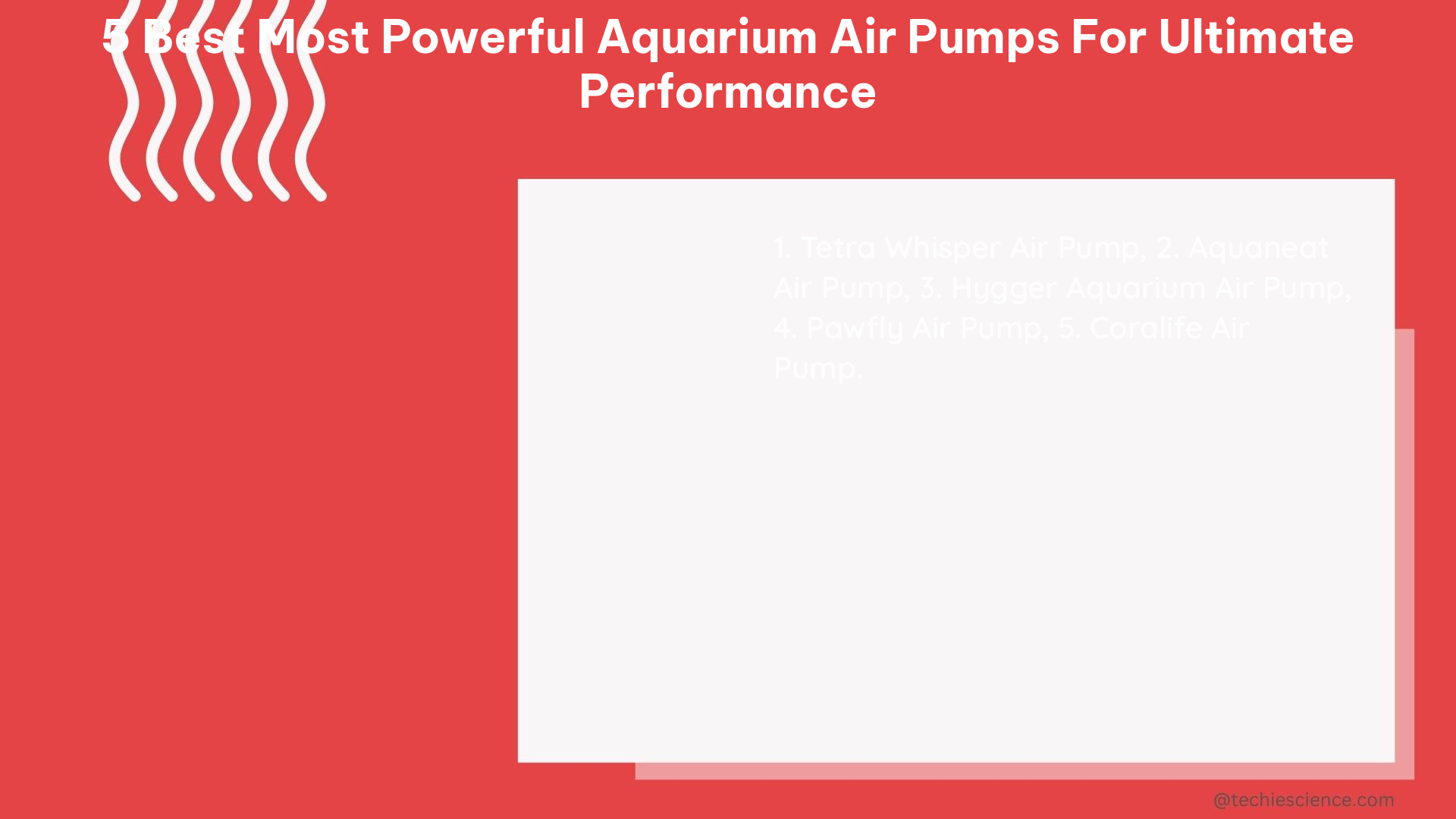When it comes to maintaining a thriving aquarium ecosystem, the air pump plays a crucial role in providing the necessary oxygen circulation and aeration. Selecting the right air pump can make all the difference in ensuring the health and well-being of your aquatic inhabitants. In this comprehensive guide, we’ll explore the 5 best and most powerful aquarium air pumps that offer unparalleled performance for your ultimate aquarium setup.
1. Aquaculture Air Pump
The Aquaculture Air Pump stands out as the top choice for its exceptional air volume and whisper-quiet operation. With an impressive air volume of 5.34 LPM (320.28 LPH / 84.50 GPH), this pump delivers ample oxygenation to even the largest aquariums. What sets it apart is its remarkably low decibel rating of 57.6, making it one of the quietest air pumps on the market.
Key Features:
– Air Volume: 5.34 LPM (320.28 LPH / 84.50 GPH)
– Decibel Rating: 57.6 dB
– Suitable for aquariums up to 100 gallons
– Durable and corrosion-resistant construction
– Thermal overload protection for safety
– Adjustable air flow control
2. Eheim Air200

The Eheim Air200 is a powerful and reliable air pump that boasts an impressive air volume of 4.11 LPM (246.74 LPH / 65.10 GPH). Despite its impressive performance, it maintains a relatively low decibel rating of 58.3, making it an excellent choice for aquariums where noise levels are a concern.
Key Features:
– Air Volume: 4.11 LPM (246.74 LPH / 65.10 GPH)
– Decibel Rating: 58.3 dB
– Suitable for aquariums up to 80 gallons
– Dual-outlet design for versatility
– Vibration-dampening feet for quiet operation
– Thermal overload protection
3. Tetra Whisper
The Tetra Whisper air pump stands out for its exceptional air volume, delivering an impressive 6.73 LPM (403 LPH / 106 GPH). This makes it an ideal choice for larger aquariums or those with high oxygen demands. While it does have a slightly higher decibel rating of 63.7, the Tetra Whisper still maintains a relatively quiet operation.
Key Features:
– Air Volume: 6.73 LPM (403 LPH / 106 GPH)
– Decibel Rating: 63.7 dB
– Suitable for aquariums up to 100 gallons
– Dual-outlet design for versatility
– Vibration-dampening feet for reduced noise
– Thermal overload protection
4. MillionAir MA-600 Air Pump
The MillionAir MA-600 Air Pump is a powerful and reliable option, boasting an air volume of 5.28 LPM (316.90 LPH / 83.61 GPH). While its decibel rating of 61.6 is slightly higher than the top-performing models, it still maintains a relatively quiet operation, making it a viable choice for medium to large aquariums.
Key Features:
– Air Volume: 5.28 LPM (316.90 LPH / 83.61 GPH)
– Decibel Rating: 61.6 dB
– Suitable for aquariums up to 100 gallons
– Dual-outlet design for increased versatility
– Durable and corrosion-resistant construction
– Thermal overload protection
5. SunSun YT-302C Aquarium Air Pump
The SunSun YT-302C Aquarium Air Pump is a more budget-friendly option, but it still delivers a respectable air volume of 3 LPM (180 LPH / 47.32 GPH). While it has a slightly higher decibel rating of 65, it may be a suitable choice for smaller aquariums or those with less stringent noise requirements.
Key Features:
– Air Volume: 3 LPM (180 LPH / 47.32 GPH)
– Decibel Rating: 65 dB
– Suitable for aquariums up to 50 gallons
– Dual-outlet design for increased versatility
– Durable and corrosion-resistant construction
– Thermal overload protection
DIY Piston Air Pump Setup
For a more customizable and potentially quieter solution, consider a DIY piston air pump setup using PVC piping. When selecting a piston air pump, pay close attention to the number of outlets, air volume, and decibel levels to ensure optimal performance and quiet operation. This approach allows you to tailor the air pump to the specific needs of your aquarium, potentially achieving even better results than the pre-built options.
Key Considerations for DIY Piston Air Pump:
– Number of Outlets: Determine the number of air stones or other accessories you need to power, and select a piston air pump with the appropriate number of outlets.
– Air Volume: Choose a piston air pump with an air volume that matches the size and oxygen requirements of your aquarium.
– Decibel Levels: Opt for a piston air pump with a low decibel rating to minimize noise in your aquarium setup.
– PVC Piping: Carefully plan and assemble the PVC piping system to ensure efficient air distribution and minimize turbulence, which can contribute to noise.
– Vibration Dampening: Incorporate vibration-dampening measures, such as rubber grommets or feet, to further reduce noise from the piston air pump.
By carefully considering these factors, you can create a customized and highly efficient DIY piston air pump setup that delivers the ultimate performance for your aquarium.
Reference:
– Amazon Best Sellers: Aquarium Air Pumps
– Piston Air Pump Recommendations
– Best Aquarium Air Pumps
– Aquarium Air Pump Guide
